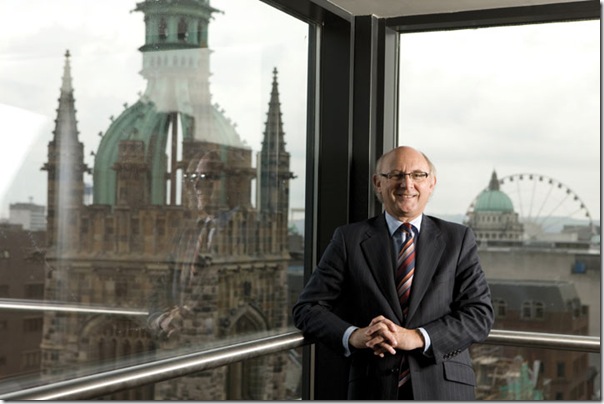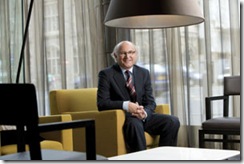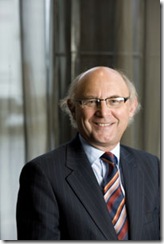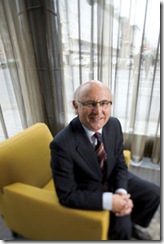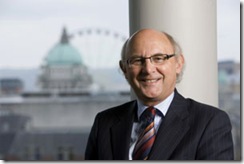Meeting need through innovation
Sir Nigel Hamilton discusses the Bryson Group’s wide range of work with Owen McQuade and outlines what being a social enterprise means. Public service, he finds, is also as much a running theme in his current role as it was in the public sector.
Better known for leading the Civil Service, Nigel Hamilton has chaired the Bryson Group since September 2008, becoming a strong believer in its work in that short time.
“We exist to meet the needs of individuals and families who are in need,” he remarks, describing the core principle that binds all its broad range of work together. Approaching the job, he was conscious of Bryson’s tremendous history of delivery. A former member, the late Peter McLachlan, had been one of his friends.
Bryson meets those needs in four main ways. The group provides health and social care throughout Northern Ireland and also in Donegal; training for job seekers in north Belfast and Newtownabbey; energy advice across the province; and recycling services also on a regional level. It also runs the Multi Cultural Resource Centre and Lagan Watersports in Belfast.
“Every day, we are providing services to 24,000 households or individuals, which is quite considerable,” Hamilton adds. “On energy, it is the largest provider of advice in Northern Ireland, helping 75,000 households (10 per cent of the overall total) last year, while it recycles 55,000 tonnes per year.” The charity also estimates that it provides 200,000 hours of care to families and those in need each year.
“It is common for large charities to have a similarly large workload. However, Bryson has moved away from the traditional model of raising and spending money, to operating as a social enterprise i.e. a business with a social benefit.
“Eighty-nine per cent of our expenditure is in contract so we tender for contracts with health and social service trusts, with the Housing Executive, DSD, with district councils,” Hamilton says. “That produces stability. A multi-year contract to provide services gives stability for staff, helps with skills and ensures a continuing focus on quality delivery.”
Bryson’s turnover was £20 million in 2008-2009, and is expected to rise to £25 million this year and £30 million in the next. Out of every pound spent, 95p goes directly to its programmes.
There is an inherent risk in losing those contracts and, as a result, much of the group’s training and development focuses on how to provide value for money and a high quality service, which in turn satisfies the client organisation.
Procurement is therefore “very much at the heart” of Bryson’s business model. Hamilton and Bryson’s senior management told the Assembly’s Finance and Personnel Committee about its importance when, as part of its inquiry into public procurement, the committee met at Bryson in mid-October.
Growing demands
Recession has though, clearly affected the public finances and going forward, cuts are inevitable. Asked how this will impact on Bryson’s work, Hamilton explains firstly that the needs and the resulting demand will become even greater.
“Those to whom we deliver services will probably need the services even more if you think that, for example, we are delivering services to individuals and families in care, those coming out of hospital, and those who are unemployed,” he comments.
Last year alone, its North City Training subsidiary helped 1,300 young people, getting 51 per cent of them into employment and 71 per cent a national vocational qualification: “There will be even more young people unemployed.”
On the ‘supply’ side, he expects health trusts will want to renegotiate contracts due to their financial pressures, perhaps resulting in reduced costs. Bryson is always caught in a balance between achieving value for money and meeting the needs of the people it helps.
Hamilton continues: “I think, in summary, the downturn produces even more people in need looking for advice on fuel, on energy, on health etc. The other two big areas are recycling and re-newables, where there are challenging EU targets for Northern Ireland and we contribute significantly towards meeting those targets.”
Bryson’s turnover grew by 7 per cent last year despite the downturn and an increase of 25 per cent is anticipated this year. He sees a need for the group to manage that growth and also identify emerging areas for work, for example ageing and the related problems of dementia and Alzheimer’s disease. The health and social care sector would like as many people affected by those conditions as possible to be treated at home. However, Bryson cannot continually expand to meet that need; its tenets of value for money and quality service would still need to stay in place.
“I think we have to be realistic,” he adds. “We are working against a background of spending review reductions, requirement for savings and cost-cutting. So we are realistic about the basis on which we are working and that is why we have to be as good as we possibly can be at our job.”
Reaching out
Hamilton was pleased to welcome First Minister Peter Robinson to Bryson’s last AGM, where he emphasised the importance which both he and the Executive place on the contribution of social enterprises. In some cases, Hamilton can also see Bryson delivering services in areas where the public sector cannot reach.
For example, in the Belfast and South Eastern health trust areas, it runs a ‘home-from-hospital’ support scheme. This means that when an elderly person is discharged from hospital more quickly, a Bryson staff member visits them four times a day for a period of six weeks to enable them to adjust back to home life. In this way, hospital beds are freed up for other patients and the individual is able to re-establish themselves at home and regain their confidence.
He knows one elderly lady who decided after four or five days that she only needed three visits the next day, as she was well settled by then: “That is the sort of thing that this particular sector can do very well because we do it with people who have flexibility and who are committed, but have the interests of the individual at heart.”
Separately, Bryson is providing parenting support to families in danger of losing their children into care, and he thinks it has been very successful in that area. It also provides advice to people from ethnic minority communities and to asylum seekers through its Multi Cultural Resource Centre. Around 4,000 people in total were given advice last year, including 190 asylum seekers.
Recycling and energy
The more industrial side of Bryson’s remit lies in its recycling and energy work. It makes 200,000 kerbside collections from homes each year and also separates and recycles mixed products from the ‘blue bins’ of 150,000 homes at its Mallusk centre.
“Northern Ireland’s recycling rate for household materials recycling is currently about 34 per cent and we think we contribute about two-thirds of that, which is very significant indeed,” he states. Bryson encourages households to separate waste at the kerbside into the relevant boxes. As with other recycling enterprises, Bryson found that the price of second hand commodities has fallen during the economic downturn, but the focus on the quality of material has provided a sound foundation.
Hamilton explains that because of the separation of paper and cardboard at source, the quality of its second hand paper remained “very high” as it did not contain recycled cardboard. Paper mills continued to buy it at a time when they were not buying from others.
“I think that is just an interesting illustration of where we are and, of course, by not depositing that material last year in landfill, we saved the rate payers £4 million.”
Around 4,500 white goods, such as fridges, freezers and cookers, were taken in, checked, refurbished and sold off at a low cost to people in need.
The Northern Ireland Energy Agency, Bryson’s energy advice arm, runs a call centre in Enniskillen which took 40,000 plus telephone calls last year. It also installs insulation as one of two DSD Warm Homes contractors, provides low energy bulbs to low income homes and offers advice about benefits which, it estimates, has ‘benefitted’ enquirers by an average of £33 per week.
Social franchising
Several of these areas of work could be described as ‘growth areas’. The population is growing older, the province’s waste must be managed and our energy supplies will become less secure as fossil fuels decline. Rather than being overcome by these trends, Hamilton is pleased that Bryson is again meeting the needs that arise.
“Issues around family breakdown and ageing will continue to intensify. I personally am delighted that in our recycling, in our environmental work and in our energy work, we are very much in areas that are important to Northern Ireland and important to the individuals.”
Two structural challenges stand out for him. Firstly, the health and social care system is being remodelled, which means that more activities may be put out for tender. ‘Social franchising’ could come about, whereby Bryson applies and wins a contract and then ‘lets’ that out to other, smaller organisations.
Also, a smaller number of larger councils will also be the end result of the Review of Public Administration. As those councils look at how they deliver their services, he hopes that they will not just look at a single model but instead consider “what’s best value for money”, outsourcing its services to social enterprises like Bryson.
In addition, he foresees the impact of the economic downturn being higher levels of unemployment and more school leavers without qualifications. Its training services are not just focused on young people, as shown by its new Grey Workers Programme, which encourages jobless over 50s back into the labour market.
“Bryson will continue to provide a very broad of range of services that will contribute to the development of an effective social policy in Northern Ireland,” he notes.
Over Bryson’s 103-year history, it has been successful by being innovative. Indeed, some of its services and work have branched out to form other well known organisations such as the Citizens’ Advice Bureaux and NICVA.
“Bryson has that history of getting involved in something and then being happy to spin it out elsewhere,” he contends. “I think we are always looking to see ‘are we doing the right things in the right areas or are there things which we should spin off?’”
There is a risk that it would lose that entrepreneurial spirit as it grows, hence Hamilton’s focus on managed growth, making sure that it stays in control, providing value for money and a quality service.
“I do not see us growing exponentially and becoming the largest employer in the voluntary sector in Northern Ireland. I think we need to do that carefully so we do not lose that interface between our staff and those in need,” he comments.
“I am a great believer in a quotation that I came across many years ago. It said: ‘Great ideas need landing gear as well as wings’, and I think our job as a board is to make sure we are rooted in reality, we are properly resourced and properly skilled.”
It is a very different role from heading the province’s Civil Service. Bryson’s previous Chairman, John Steele, had asked Hamilton to take on the job before he retired from the public sector and, reading over its activities, he discovered that it was a “great story not yet told publicly.”
His role is to be a non-executive Chairman, although he takes a keen interest in what is going well and not so well within its work: “I do not get involved in day-to-day activities. I am here to be very supportive of John [McMullan] as the Chief Executive, to give a strategic overview, to challenge, to make sure it is resourced.”
Across the organisation what strikes him is that Bryson is “delivering services to people in need” and that ethos is reflected in that attitude of its staff. He is proud of the achievements of excellence throughout the organisation including, for example, Investor in People and European Framework of Quality Management awards.
“It is people interested in people, particularly those who probably most need support and help,” he says in conclusion. “And I think there is nothing more rewarding for someone, particularly someone from my background, to see a young person who is disaffected with the education system coming through our training organisation; to see an elderly person who is rehabilitated at home; to see what we are doing at the leading edge of the energy and recycling things, because ultimately it is helping people – which is what public service is all about.”
Profile: Sir Nigel Hamilton
“Believe that a further shore is reachable from here”, a line from Seamus Heaney’s poem ‘Cure at Troy’ stands out for Sir Nigel. In his view, it is always important to have vision or “to say there is further shore and reachable from here”.
He also chairs the Prince’s Trust and is particularly impressed by programmes that help young people who have dropped out of the education system make something more of their lives. A ‘learn-to-cook’ programme, run by some of Belfast’s best known chiefs, is one example. He recalls how a young single mother going through it has now signed up for a permanent course at Belfast Metropolitan College, as she
thinks this is the best way to provide for herself.
As Senior Vice-President of Ulster Rugby, he is pleased to see that province improving its form this year. From next June, he will serve as its President. Some similarities with Bryson stand out as Ulster is a business and its facilities need to be provided, with the team and club game built up professionally.
He also holds a number of directorships in private sector and is proud to be a “besotted grandfather” of an almost four-year old grandson, who considers him the “best Lego builder in the world.”

